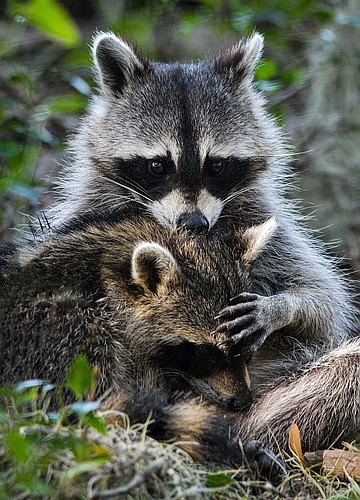- May 10, 2025
-
-
Loading

Loading

A native species, raccoons are among the most intelligent of Florida’s wildlife. Historically found in our forests, wetlands and along river and stream corridors, these highly adaptable omnivores, which will eat just about anything, have, by necessity, learned to thrive in close proximity to humans.
In their natural Wild Florida habitats, their typical diet consists of fruits, grains, nuts and vegetables, along with small mammals, amphibians, insects and reptiles. In urban Florida, where wild food is less abundant, they will also happily help themselves to anything they find in your garbage.
Raccoons tend to do most of their foraging at twilight and at night. Their dark masks are believed to help reduce glare and improve vision in low-light environments. And although they have very keen night vision, their most highly tuned sense is touch: Their extremely dextrous hands, capable of highly complex tasks, are full of sensitive receptors.
And wetting their hands helps increase the responsiveness of those nerves — which is why you'll often see raccoons “washing” their food or hands.
Despite habitat reduction due to development, as well as being extensively hunted for their meat and fur, raccoons have been able to thrive in Florida. Given their important role in Florida's ecosystems, this is a very good thing. In addition to being helpful seed dispersers, raccoons are important predators and pest controllers. Indeed, raccoons have a great affinity for insects in both larvae and full form. They will even eat wasps, which helps protect bees, and other threatened pollinators, critical for Florida ecosystems. And, as scavengers, by removing rotting meat or plant matter, raccoons play a central role in helping keep Wild (and less wild) Florida healthy.
But once accustomed to being fed or having easy access to food, raccoons lose their natural fear of humans and will move closer to food sources. To keep these important residents of Wild Florida safe and away from our own living spaces, we can avoid leaving trash, bird seeds or pet food outdoors (especially overnight). And when spending time in Wild Florida, we should never feed wildlife.
Friends of Myakka River exists to support Myakka River State Park and the Wild and Scenic Myakka River. Together, we're protecting and sharing Myakka's Magic, to the benefit of future generations, and our own. Follow us @FriendsofMyakkaRiver.